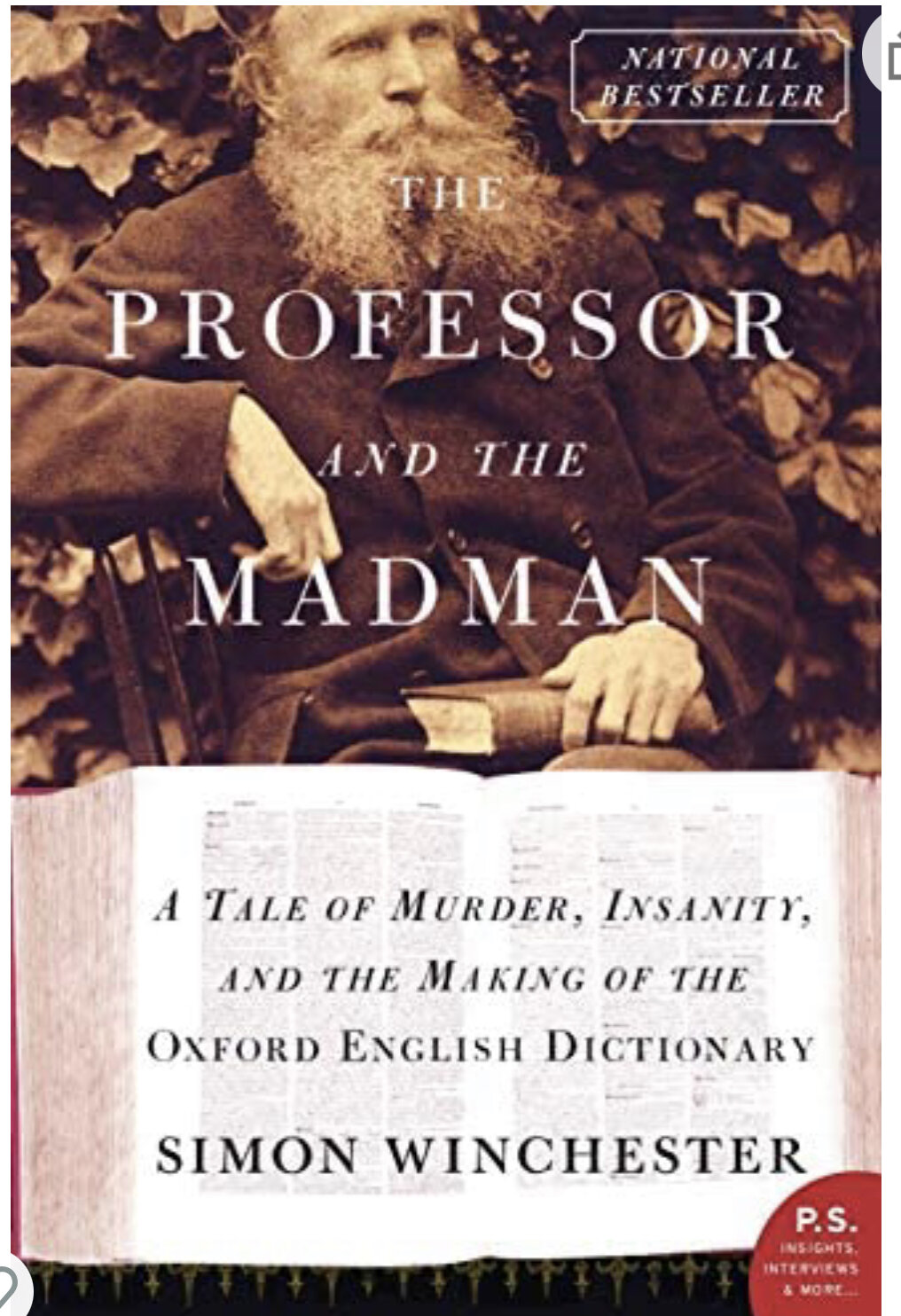Book Review: The Professor and the Madman, A Tale of Murder, Insanity and the Making of the Oxford English Dictionary, by Simon Winchester
This surprisingly moving narrative set in Victorian England braids together three histories. First, the making of the great Oxford English Dictionary (OED), which took seventy years to complete. Second, the life of the professor, Dr. James Murray, the OED’s third and justly most famous editor, who worked on it for the last forty years of his life. And third, the life of the madman, Dr. William Chester Minor, major contributor to the OED, an American, Yale educated physician, whose illustrious career as a Union officer and surgeon during the Civil War ended due to mental illness that rendered him “unfit for duty” and led to tragedy.
A year after discharge Dr. Minor traveled abroad to London, a gun secreted in his luggage, where he shot a man while under the influence of paranoid delusions. He was in his mid-30’s. He was institutionalized for more than thirty years in a British insane asylum. Despite his relentless psychosis, for over twenty of those asylum years, into his 50’s, he enriched the OED with thousands of contributions. Thereafter, the illness took him for its own and he declined into a second tragedy.
Meticulously researched, dense with incredibly interesting information, and beautifully written, the book is a page turner. Each chapter opens with the OED definition— in all its labor-intensive grandeur—of one word, which foreshadows the chapter’s subject matter. The author’s sentences are often long, with information packed clauses between noun and verb, implying the overwritten style of the Victorian era without actual clutter. The story lines seamlessly weave together from chapter to chapter, building drama and historical context. It’s an immersive read—a great read—leisurely, thoughtful and thought provoking.
Dr. Minor’s high level of functioning despite severe symptoms is a puzzle of great interest to me as a psychiatrist. Active psychotic symptoms generally make intellectual work impossible, and worse, induce an interpersonal disconnect from others, isolating the sufferer from family, friends and the community. To date, we do not understand what goes wrong in the brain that leads to psychosis.
Yet Dr. Minor became one of the OED’s most prolific, reliable and scholarly contributors while suffering tormenting “incurable” psychotic symptoms (there were no viable treatments in the 1800’s), as well as having genuine friendships with the director of the asylum and his editor Dr. Murray. Even more astonishing, he made amends to the widow of the man he murdered by supporting her and her seven children with his army pension, and she forgave him.
It seems to me that the social and environmental supports the asylum allowed Dr. Minor during his middle years significantly mitigated these negative cognitive and interpersonal effects of the illness. Privilege without doubt played a positive role.
His upper-class status, education, gracious disposition (when not acutely paranoid), support of family and many socially connected advocates, and the steady stream of money from his pension gained him special advantages in the asylum. He was given two cells, one of which became his library and study. He was allowed books, supplies, a desk and other furniture. And he was able to pay a fellow inmate to keep his rooms clean and tidy.
Thus, unlike most mentally ill patients of his day—and ours—he was spared the killing stress of having to manage basic tasks of daily living burdened with disabling symptoms, while impoverished and socially abandoned. A supportive environment didn’t treat his psychosis, or the suffering, but did make it possible for Dr. Minor to have a life. Contributing to the OED gave him a purpose, relationships in the larger community outside the asylum, and a legacy with future generations of readers. Amazing.
About 1% of the population—a staggering number of people— suffers from schizophrenia (the most common psychotic disorder; there are others). Could combining that kind of targeted environmental support with medication improve lives? It hasn’t been tested in a meaningful way. Food for thought.
The OED, despite all its flaws, is a triumph of sustained human effort and devotion. Seventy years is a long time. The right editor, publishing house and academic support were essential but insufficient to bring the massive project to completion. That required the contributions of thousands of unpaid volunteers who labored for love. Money is over-rated as a motivator. More food for thought.
But enough of my thoughts. Read this fascinating historical gem and think your own. Bon apetit!
Not all who wander are lost, and not all who see a shrink are crazy. Find out more here.

